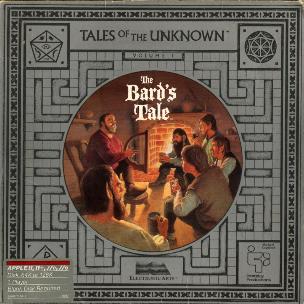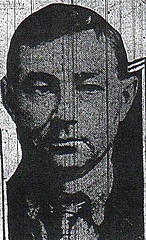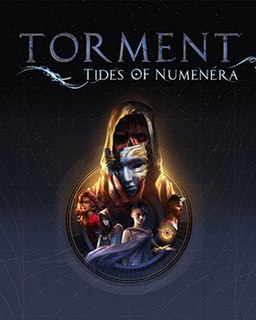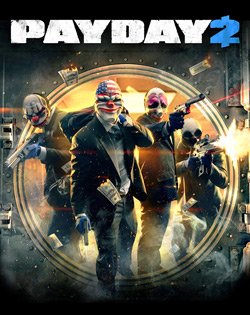Related Research Articles

Wasteland is a science fiction open world role-playing video game developed by Interplay and published by Electronic Arts in 1988. The game is set in a futuristic, post-apocalyptic America destroyed by a nuclear holocaust generations before. Developers originally made the game for the Apple II and it was ported to the Commodore 64 and MS-DOS. It was re-released for Microsoft Windows, OS X, and Linux in 2013 via Steam and GOG.com, and in 2014 via Desura.

Bank robbery is the criminal act of stealing from a bank, specifically while bank employees and customers are subjected to force, violence, or a threat of violence. This refers to robbery of a bank branch or teller, as opposed to other bank-owned property, such as a train, armored car, or (historically) stagecoach. It is a federal crime in the United States.

The Bard's Tale is a fantasy role-playing video game designed and programmed by Michael Cranford for the Apple II. It was produced by Interplay Productions in 1985 and distributed by Electronic Arts. The game was ported to the Commodore 64, Apple IIGS, ZX Spectrum, Amstrad CPC, Amiga, Atari ST, DOS, Macintosh, and NES. It spawned The Bard's Tale series of games and books. The earliest editions of the game used a series title of Tales of the Unknown, but this title was dropped for later ports of The Bard's Tale and subsequent games in the series.

Frank Brian Fargo is an American video game designer, producer, programmer and executive, and founder of Interplay Entertainment, inXile Entertainment and Robot Cache.

Sly Cooper and the Thievius Raccoonus is a platform stealth video game created by Sucker Punch Productions that was released on the PlayStation 2 in 2002. The game was followed by three sequels, Sly 2: Band of Thieves, Sly 3: Honor Among Thieves and Sly Cooper: Thieves in Time. On November 9, 2010, Sly Cooper and the Thievius Raccoonus, as well as its first two sequels, were released together as The Sly Collection, a remastered port of all three games on a single Blu-ray as a Classics HD title for the PlayStation 3.

The Codemasters Software Company Limited is a British video game developer based in Southam, England, which is a subsidiary of American corporation Electronic Arts. Founded by brothers Richard and David Darling in October 1986, Codemasters is one of the oldest British game studios, and in 2005 was named the best independent video game developer by magazine Develop.

inXile Entertainment, Inc. is an American video game developer and a studio of Xbox Game Studios based in Tustin, California. Specializing in role-playing video games, inXile was founded in 2002 by Interplay co-founder Brian Fargo. The studio produced the fantasy games The Bard's Tale and Hunted: The Demon's Forge, along with various games for Flash and iOS such as Fantastic Contraption in its first decade of development. In 2012, inXile released the post-apocalyptic game Wasteland 2, following a successful Kickstarter campaign. Following the game's critical success, the studio went on to raise a then-record US$4 million on Kickstarter to develop Torment: Tides of Numenera, a spiritual successor to Interplay's Planescape: Torment. inXile has since finished developing Wasteland 3.
The heist film or caper film is a subgenre of crime film focused on the planning, execution, and aftermath of a significant robbery.

The Lufthansa heist was a robbery at New York City's John F. Kennedy International Airport on December 11, 1978. An estimated $5.875 million was stolen, with $5 million in cash and $875,000 in jewelry, making it the largest cash robbery committed on American soil at the time. Jimmy Burke, a Lucchese crime family associate, was reputed to be the mastermind of the robbery, but he was never officially charged in connection with the crime. Burke is also alleged to have either committed or ordered the murders of many of those involved in the months following the robbery to avoid being implicated in the heist. The only person convicted in the robbery was Louis Werner, an airport worker who helped plan the heist.
The Loomis Fargo Bank Robbery was a robbery of $17.3 million in cash from the Charlotte, North Carolina, regional office vault of Loomis, Fargo & Co. on the evening of October 4, 1997. The robbery was committed by Loomis vault supervisor David Scott Ghantt, his married girlfriend Kelly Campbell, Steven Eugene Chambers, his wife Michelle Chambers, Michael Gobbies, and four other co-conspirators. An FBI criminal investigation ultimately resulted in the arrest and conviction of eight people directly involved in the heist, as well as sixteen others who had indirectly helped them, and the recovery of approximately 88% of the stolen money.
The Kill Point is an American television series that follows a group of U.S. Marines recently returned from serving in Iraq as they come together to pull off a major bank heist of a Three Rivers Bank branch in Pittsburgh. The series, produced by Mandeville Films and Lionsgate Television, is the first drama for the Spike TV network. The film of the series had the working title The Kill Pitt.
Meantime was a cancelled role-playing video game originally intended for the Apple II and possibly for the Commodore 64. It was a follow-up to 1988's Wasteland, produced by Interplay, using the same engine as Wasteland. Brian Fargo halted development for this platform, in part due to the falling 8-bit computer market. Later attempts were made to finish the game for MS-DOS, but the project was canceled for good after the release of the competing Ultima VII, as it was felt they would be releasing a graphically inferior product.

The Getaway is an action-adventure open world video game developed by Team Soho and published by Sony Computer Entertainment for the PlayStation 2. The Getaway is inspired by British gangster films, most notably Get Carter and Snatch. Initially, the release of the game was to coincide with the launch of the PlayStation 2 in 2000, but was delayed by 27 months due to the difficulty of re-creating large areas of London in high resolution. Parts of The Getaway feature in various episodes of Graham Duff's Ideal.

The Big Heist is a 2001 crime drama television film directed by Robert Markowitz and written by Jere Cunningham and Gary Hoffman. The film, based on the 1986 non-fiction book The Heist by Ernest Volkman and John Cummings, tells the story of the 1978 Lufthansa heist. It is a co-production of the United States and Canada, and stars Donald Sutherland, John Heard, Jamie Harris, and Janet Kidder. It aired on A&E on June 10, 2001.

Herman Karl Lamm, known as Baron Lamm, was a German-American bank robber. A former Prussian Army soldier who immigrated to the United States, Lamm believed a heist required all the planning of a military operation. He pioneered the concepts of "casing" a bank and developing escape routes before conducting the robbery. Using a meticulous planning system called "The Lamm Technique", he conducted dozens of successful bank robberies from the end of World War I.

Wasteland 2 is a post-apocalyptic role-playing video game developed by inXile Entertainment and published by Deep Silver. It is the sequel to 1988's Wasteland, and was successfully crowdfunded through Kickstarter. After the postponement of the original release date from October 2013, it was released for Microsoft Windows, OS X, and Linux in September 2014. An enhanced version of the game, named Wasteland 2: Director's Cut, was released in October 2015, including versions for PlayStation 4, Xbox One, and Nintendo Switch.

Torment: Tides of Numenera is a role-playing video game developed by inXile Entertainment and published by Techland Publishing for Microsoft Windows, macOS, Linux, PlayStation 4 and Xbox One. It is a spiritual successor to 1999's Planescape: Torment.

Payday 2 is a cooperative first-person shooter video game developed by Overkill Software and published by 505 Games. The game is a sequel to 2011's Payday: The Heist. It was released in August 2013 for Windows, PlayStation 3 and Xbox 360. An improved version of the game, subtitled Crimewave Edition, was released for PlayStation 4 and Xbox One in June 2015. A version for the Nintendo Switch was released in February 2018.

Wasteland 3 is a role-playing video game developed by inXile Entertainment and published by Deep Silver. It is a sequel to Wasteland 2 (2014) and was released for Microsoft Windows, PlayStation 4 and Xbox One on August 28, 2020. It was ported to Linux and macOS on December 17, 2020.
References
- 1 2 3 4 5 6 Simmons, Alex (20 April 2007). "Hei$t First Look". IGN . Retrieved 16 August 2020.
- ↑ Wanderer (April 2007). "Cover Story: Hei$t". Hardcore Gamer. Vol. 2, no. 10. pp. 30–39. Retrieved 22 August 2020.
- ↑ Cundy, Matt (20 April 2007). "Heist - first look". GamesRadar+ . Retrieved 22 August 2020.
- 1 2 3 4 5 6 7 Cocker, Guy (19 April 2007). "Hei$t Impressions". GameSpot . Retrieved 19 August 2020.
- 1 2 3 Freeman, Will (19 April 2007). "HEI$T First Look Preview". VideoGamer. Retrieved 21 August 2020.
- 1 2 3 4 5 Nguyen, Thierry (19 April 2007). "Previews: HEI$T". GameSpy . Retrieved 22 August 2020.
- 1 2 3 Bishop, Stuart (23 July 2007). "Interview: Hei$t". Computer and Video Games. Archived from the original on 24 November 2007. Retrieved 21 August 2020.
- ↑ Rojewski, Patryk (3 December 2007). "HEI$T - przed premierą". Gry Online . Retrieved 22 August 2020.
- 1 2 Nunneley, Stephany (15 April 2013). ""I could not be happier": Fargo on fans as publishers". VG247 . Retrieved 16 August 2020.
- ↑ Craddock, David (25 April 2007). "Hei$t Interview". Shacknews . Retrieved 22 August 2020.
- ↑ Wallis, Alistair (8 June 2007). "Tooling Around: Pathfinding With The PathEngine SDK". Gamasutra . Retrieved 16 August 2020.
- ↑ Bishop, Stuart (20 March 2007). "Codemasters gets criminal in HEI$T". GamesRadar+ . Retrieved 22 August 2020.
- ↑ Staff (19 April 2007). "Code 07 : Hei$t". Jeuxvideo.com . Retrieved 22 August 2020.
- ↑ Geddes, Ryan (13 December 2007). "Codemasters Unlocks 2008 Lineup". IGN . Retrieved 22 August 2020.
- 1 2 Purchese, Robert (29 January 2010). "Codemasters "terminates" Hei$t". Eurogamer.net. Retrieved 9 February 2014.